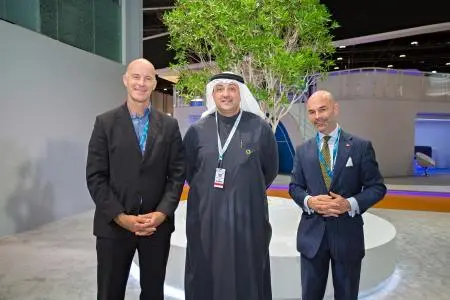PHOTO
Dubai, UAE – GCC countries can be one of the most competitive locations globally to produce and export green hydrogen and derivatives such as green ammonia or power fuels, thanks to unique natural (solar & wind) resources, abundant space as well as world class infrastructure and expertise.
The lowest-cost solar and wind energy globally make the GCC region potentially one of the most competitive for hydrogen production. A recent tender in Saudi Arabia was awarded for a price of USD 0.0104/kWh. Taking advantage of the Oil & Gas economy, significant funding is available through sovereign funds as well as international investors. Furthermore, the region has a proven track-record in building and operating export infrastructure and it has a central location to future large energy demand markets, such as the European and East-Asian markets. Lastly, the region highly qualified workforce in the oil& gas sector also represents a major opportunity for the development of the hydrogen economy in the region. In addition to the export market, GCC countries could cater for their regional demand.
Key findings of the joint paper include:
- Long term renewable energy deployment of up to 1,000 GW, with up to 500 GW electrolyzer capacity, leading to the production of approximately 100m MT of green hydrogen.
- Annual revenues from green hydrogen in GCC could grow up to USD 200 bn by 2050.
- High job creation potential across different parts of the value chain: Up to 1 million jobs by 2050.
- Different projects under development mark the start of a big movement with countries like Saudi Arabia e.g. planning to become the world’s largest exporter of green hydrogen.
- International experiences from hydrogen valleys show that this concept could be a key enabler in creating local hydrogen economies.
- GCC countries should address four key enablers to unlock the green hydrogen potential:
- Set realistic and quantified targets for their strategies with a comprehensive and integrated approach, as well as define a governance body to coordinate and oversee the development of the hydrogen ecosystem.
- Building hydrogen valleys, combing green hydrogen production, storage, distribution and end-use in one geographical area.
- Engaging in international and technology partnerships.
- Enhancing capacity building programs to prepare the qualified work force across its wider value chain.
Among the partners that contributed to the paper, Masdar has played an important role during the series of interviews. Masdar and Dii Desert Energy share the belief that innovation and partnerships will accelerate the global energy transition towards cleaner energy sources and that green hydrogen is a key enabler to achieve a long-term sustainability strategy for socio-economic development and green job creation.
Mohamed Jameel Al Ramahi, the CEO of Masdar, said: “Green hydrogen has great potential not just as a fuel of the future, but as the foundation of an industry requiring new technology and a new generation of skilled employees. The demonstrator plant we are building in Masdar City with our partners will go a long way to proving the commercial viability of green hydrogen.”
Cornelius Matthes, Chief Executive Officer of Dii Desert Energy, said: “Building on the first major study of the job creation potential for the solar & wind value chain (Economic Impacts of Desert Power, 2013), Dii is thrilled about the partnership with Roland Berger to jointly analyze the job creation potential of the entire hydrogen value chain, a huge opportunity for the GCC region. Creating sustainable jobs and good perspectives, particularly for young people, are an integral part of the socio-economic development and the hydrogen value chain provides a great opportunity for the much needed diversification of the economies in the region.”
Vatche Kourkejian, Partner at Roland Berger, said: “The GCC region is on the verge of a new era similar to the discovery of oil decades ago. In our joint study with Dii Desert Energy, we showcase the huge potential that green hydrogen pauses for the GCC region and the opportunity to continue being the main energy supplier to the world in a sustainable manner. The study looks at green hydrogen's job creation potential as well as the opportunities for localization of parts of the value chain, which would be transformative for the region's economy and drive for diversification.”
This press release is available in English and Arabic. The full version of the report ‘‘The Potential for Green Hydrogen in the GCC Region’ is available to download here.
© Press Release 2021
Disclaimer: The contents of this press release was provided from an external third party provider. This website is not responsible for, and does not control, such external content. This content is provided on an “as is” and “as available” basis and has not been edited in any way. Neither this website nor our affiliates guarantee the accuracy of or endorse the views or opinions expressed in this press release.
The press release is provided for informational purposes only. The content does not provide tax, legal or investment advice or opinion regarding the suitability, value or profitability of any particular security, portfolio or investment strategy. Neither this website nor our affiliates shall be liable for any errors or inaccuracies in the content, or for any actions taken by you in reliance thereon. You expressly agree that your use of the information within this article is at your sole risk.
To the fullest extent permitted by applicable law, this website, its parent company, its subsidiaries, its affiliates and the respective shareholders, directors, officers, employees, agents, advertisers, content providers and licensors will not be liable (jointly or severally) to you for any direct, indirect, consequential, special, incidental, punitive or exemplary damages, including without limitation, lost profits, lost savings and lost revenues, whether in negligence, tort, contract or any other theory of liability, even if the parties have been advised of the possibility or could have foreseen any such damages.




















